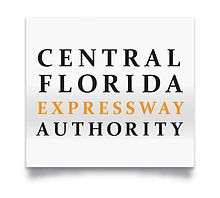Central Florida Expressway Authority

The Central Florida Expressway Authority (CFX) is an expressway authority responsible for construction, maintenance and operation of toll roads in four counties of Greater Orlando (Lake, Orange, Osceola, and Seminole Counties). It was created in 2014 to replace the Orlando–Orange County Expressway Authority (OOCEA), which only had authority in Orange County, and as of 2016 no roads outside that county have been added to the system. Other toll roads in the area are operated by Florida's Turnpike Enterprise (successor to the Seminole County Expressway Authority) and the Osceola County Expressway Authority; with the latter of which possibly merging into CFX some time after 2018.[1]
The Wekiva Parkway, the final piece of a beltway around Orlando, is planned for completion through Lake and Orange Counties by 2021.
CFX operates an electronic toll collection system known as E-Pass, one of the first systems of its kind in the United States. Use of the state's SunPass system is also available on CFX roads.
History
CFX was founded in 1963 for the purpose of building the Bee Line Expressway, and soon built the East-West Expressway.
The following roads were built by CFX:
- Beachline Expressway (SR 528) from State Road 15 to State Road 520, 1966-1967
- East-West Expressway (SR 408) from State Road 50 west of State Road 435 to State Road 50 east of State Road 551, 1972-1973
- Beachline Expressway (SR 528) from State Road 482 to State Road 15, 1981-1983
- Central Florida GreeneWay (SR 417) from State Road 50 to Seminole County, 1987-1988
- East-West Expressway (SR 408) from State Road 551 to State Road 50 east of State Road 434, 1987-1989
- Central Florida GreeneWay (SR 417) from State Road 528 to State Road 408, 1989-1990
- East-West Expressway (SR 408) from Florida's Turnpike to State Road 435, 1989-1990
- Central Florida GreeneWay (SR 417) from International Drive to State Road 528, 1991-1993
- Western Beltway (SR 429) from Florida's Turnpike to U.S. Highway 441, 1998-2001
- Goldenrod Road Extension, 2001-2003
- Western Beltway (SR 429) from County Road 535 to Florida's Turnpike, 2001-2002
- Western Beltway (SR 429) from Seidel Road to County Road 535, 2004-2005
- John Land Apopka Expressway (SR 414) from State Road 429 to U.S. Highway 441, 2008-2009
Many sections of the current expressway system, such as the connection of SR 528 from Sand Lake Road to I-4, the sections of SR 417 in Seminole and Osceola counties, and SR 429 south of Seidel Road, were built by the Florida's Turnpike Enterprise, and their toll facilities are managed by the same.
Beginning in 2007, CFX began transitioning its signage from FHWA Series E modified typeface to signs that use the new Clearview typeface.
The newest addition to the CFX system is an extension of Maitland Boulevard (State Road 414) known as the John Land Apopka Expressway. The expressway opened on May 15, 2009. The project was inherited from the Florida Department of Transportation, which referred to it as the "Apopka Bypass". Planning is also underway for an extension of State Road 429 known as the Wekiva Parkway. In addition, SR 408 underwent a massive overhaul, including the relocation of its two main toll plazas, large sections of widening, and expansion of a bridge over Lake Underhill.
The current 25-year plan, the "2030 Master Plan", includes two new toll connections to Brevard County (including an extension of SR 408), a new connection from Sanford to New Smyrna Beach parallel to State Road 415, a southern bypass of SR 417 to Florida's Turnpike south of St. Cloud, and a connection from the Western Beltway to U.S. Highway 27 south of Clermont.
A 2013 grand jury investigation into the CFX, found a "culture of corruption," involving gifts and campaign donations. CFX was criticized for firing the Director who was attempting to stop this corruption, replacing him with a legislator with no experience of running a toll operation. The job paid over $175,000 annually.[2][3]
Canceled projects
The Central Connector, known by the Florida Department of Transportation as State Road 529[4] (SR 529), was a proposed tollway planned to parallel Orange Avenue (SR 527) between downtown Orlando and the Beachline Expressway. The project was canceled in 1991 after much local opposition.
Cost
In 2010, CFX was attempting to keep the average toll to $0.11 per mile.[5]
References
- ↑ Frequently Asked Questions about CFX, accessed June 2014
- ↑ http://www.floridatoday.com/article/20140115/OPINION/301150004/
- ↑ Tracy, Dan (2013-12-28). "Orlando Expressway Authority in turmoil, faces uncertain future". Orlando Sentinel. Retrieved 2014-01-18.
- ↑ Orange County Comptroller - Official Records Archived May 4, 2008, at the Wayback Machine. book 5045 page 2928
- ↑ Schweers, Jeff (6 December 2010). "New Beachline plaza won't increase toll". Melbourne, Florida: Florida Today. pp. 1A.